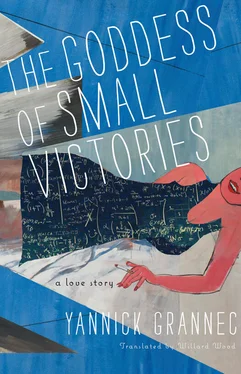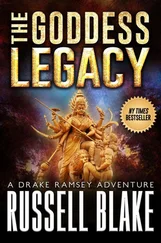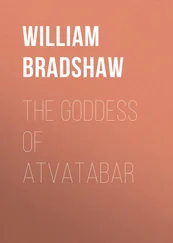Kurt rolled his eyes. Charles gave his tom-tom a few taps.
“What do you know of your wife’s anxieties?”
“He doesn’t know fuck-all!”
A loud bong put me back in my place. I would have to make him eat his goddamn drum.
“Adele complains all day long about our lack of money. She never has enough. I’m doing what I can. I’ve just accepted a teaching position. The workload and the responsibilities that go with it are very burdensome.”
I seethed on my couch. Another measly $4,000 per year! Not exactly swimming in champagne! The position had been offered to him thanks to Oppenheimer’s kindness and the twin support of Einstein and Morgenstern. His colleague Carl Siegel had always refused to ratify his appointment. He had even gone on record saying, “One madman at the Institute is enough!” I never knew who the other one was. Himself, maybe. And when it came to his duties! He poisoned life at the Institute with his constant machinations. The agenda at every meeting started with: “Who is going to beat up on Gödel today?”
“I’ve received numerous honors in recent years. That should satisfy my wife. But she insists on her share of the glory. For instance, when I received my honorary diploma from Harvard. I personally hate this kind of occasion. Yet she insisted on being seated next to me at the ceremony. It was totally unreasonable. She caused a terrible flap with the organizers.”
The tom-tom sounded to stop him from continuing.
“What a liar! He has chased after recognition all his life! Even Albert knows this! Why do you think they gave you the first Einstein Award? 36Out of pity! To pay the hospital bill! How could we have managed otherwise?”
Bong! Bong! Bong! Kurt, his face ashen, gripped the long fur of his chair as though hoping to claw his way into the womb. “It’s not as if you needed this, old friend,” Albert had whispered as he handed him the prize. It convinced no one, especially Einstein.
I’d ended the round with a knockout. I fished my compact from my bag, refreshed my makeup, and favored my audience with the celebratory sound of my lips smacking. It was Kurt’s turn to make a move, but he had never been comfortable in the ring. In the silence that followed, Hulbeck rose to his feet and made a further triple circuit around his office.
“You should see your relationship as a dynamic system with a fragile equilibrium. Both of you are at the same time victims and perpetrators. My work will consist in helping you articulate your dissatisfactions without becoming aggressive. Do you mind if I smoke?”
Kurt shrugged. The therapist offered me a cigarette and lit it using a mushroom-shaped lighter from a side table. He left the room to ask his secretary to prepare coffee. A pregnant silence. I felt myself relenting. I watched my husband out of the corner of my eye. Maybe I had gone a little far.
After pouring the coffee, Hulbeck resumed his seat at his desk and started fiddling with a strange object. I wasn’t about to ask him what it was, but he noticed my interest.
“A replica of Goethe’s death mask. I always keep it at hand.”
“Good God, whatever for? How morbid you are!”
“Do you have a problem with death, Adele?”
“Who doesn’t? But I don’t have to fiddle with disgusting objects because of it.”
His mouth contracted into a parody of a smile.
“How would you describe your private relations? Your sexuality. Kurt?”
I held back a nervous laugh. “Go to the blackboard, Gödel! Have you completed your homework?” Hairs, sex, lust — the words were foreign to his vocabulary. He hadn’t even noticed that I’d stopped having my period. But then he wouldn’t know that since he never touched me. Was it really necessary for our life to turn into this cold war? Sleeping in separate bedrooms. Eating meals alone, standing in front of the window. Somewhere in the world, somewhere in this town, there might be a man for me. A stranger who would make me laugh and dance. Who would take me into his bed. Why did I never follow a chance encounter to the hotel? For fear of gossip?
From a residual love of Kurt? Shame over my aging body? A lack of opportunity, probably.
“When did you go through menopause, Adele?”
It was my turn to feel discomfited. This was a low blow. Kurt hunched deeper into his chair.
“Might that not be the root of the problem? Your husband has his work, and you have … your husband. Couldn’t the marital dynamic be unbalanced by the fact that you have no child?”
I drew nervously on my cigarette. I had long ago shelved the idea of motherhood, even when my womb still shouted that it was possible. Kurt might eventually have given in, as he had with the house. I was so bored. He might at least have agreed to try and make me a child. Another item on his list of resolutions, where decision often counted as doing. But my biological clock had shut down the debate. No new soul had consented to appear in our house. We even thought of adopting a little girl after the war, but Kurt couldn’t bring himself to bestow the Gödel name on someone who didn’t share his blood. It had taken him ten years, after all, to share his name with me.
What would our son have been like? I’ve often asked myself, as a delicious exercise in mortification. I saw him as an only child. The kid of older parents. I never imagined us as having a “Miss Gödel.” The world is no place for girls. “Blessed art Thou, who has not made me a woman!” as my friend Lili Kahler-Loewy taught me, quoting the Torah.
I answered Hulbeck with all the calm I could muster. On this score, I was unwilling to display my emotions.
“We chose not to have a child.”
I would have wanted to call our son “Oskar,” in honor of our faithful friend Morgenstern, even though he irritated me. Marianne would have insisted on “Rudolf,” in tribute to her dead husband. In the end, he would have been called “Rudolf,” like Kurt’s brother and father. Einstein, von Neumann, and Oppenheimer would have attended his christening. His eyes would have been blue, like both of ours. Raised in America, he would have had strong, white teeth set in the square jaws of a conqueror. Would he have liked chewing gum? It’s hard to think while you’re chewing; Kurt wouldn’t have allowed gum. Would he have been a scientist? He would have wrecked his life trying to live up to his father. How can you be a god’s son without being a god yourself? Barred from Mount Olympus, these kids have a choice between madness and mediocrity, or at least what is termed mediocrity by geniuses, although the rest of us call it “normality.” That’s what Albert’s sons had chosen: the more brilliant had ended up a schizophrenic, the other an engineer. What a disappointment! “One cannot expect one’s children to inherit a mind,” he’d said. Dear Albert, so kind and so cruel at the same time, like any self-respecting god.
The Vienna-born child might have become a musician. What might the one born in Princeton have been? A sculptor, maybe. In which case Rudolf Gödel senior would have sold girdles so that Kurt Gödel could be a scientist and his grandson an artist. And what would the son of my son have done? He’d have closed the circle by selling his father’s art.
And what if our boy had had a talent for sports? If what gladdened him was running with the big crew-cut youths one saw on campus? I’d have congratulated fate on its sense of irony, for making Kurt accompany his son to baseball games when he avoided physical exercise like the plague.
But Kurt never gave me permission to have a child. It would have opened the door to the unforeseen, the uncontrollable. To disappointment. Our son chose well in staying away. I wouldn’t have had enough strength for all three of us.
Читать дальше












